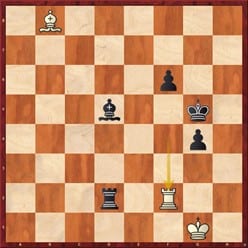by Paul van der Sterren
People sometimes inquire about my personal memories of Max Euwe. And I often feel that what they really want to know, but are afraid to ask, not wanting to appear insensitive as to my actual age, is: “Have you ever played against him?”.
However, the truth is that I have actually played against Euwe once, albeit in the same way that tens of thousands of chess players have played against him throughout his entire adult life: in a simul.
The year was 1972 and the location Roermond, a city I visited often in those days as a result of my mother having grown up there. Because I already had attained some local fame, having won the championship of the province of Limburg at the tender age of fifteen, the atmosphere around my board was one of excitement and expectation.
I realized very well that this was a unique opportunity to test my strength against a player of the highest quality, and I was happy and eager to start the game.
Euwe’s opening moves are cautious, no Volga Gambit. Soon, a symmetrical and relatively uneventful position arises in which black is slightly more active. The queens are exchanged, but black maintains the initiative. Euwe sacrifices a pawn to avoid being pushed into the defensive.
Tactical skirmishes arise which we both manage to navigate unscathed, but then the balance definitively tips in my favour: an endgame arises with 3 pawns against 1 on one flank plus a couple of rooks and bishops of unequal colour. Obviously I am winning, but… Euwe dug in.
Euwe – Van der Sterren, after 51. Rf2
I avoid rook exchanges, very insightful or by coincidence? My pawns advance agonizingly slowly, and his king is being driven into a corner. Euwe fights for every inch of ground, but after 70 moves he has to resign. A beautiful simultaneous game!

51…Rd4 52.Bc7 f5 53.Bd8+ Kg6 54.Bc7 Bf3 55.Rc2 Kg5 56.Rc5 Rd2 57.Rc3 Kh4 58.Bf4 Rd4 59.Be5 Re4 60.
Bc7 f4 61.Ra3 Kg3 62.Ra1 Re7 63.Ba5 Kh3 64.Re1 Rh7 65.Rf1 Ra7 66.Bd2 Ra2 67.Bxf4 Rg2+ 68.Kh1 Rg3+ 69.Rxf3 Rxf3 70.Bh2 g3 0-1
Nowadays, with all the experience that I didn’t have at the time, what strikes me most when looking back, is how absolutely sportsmanlike Euwe behaved in this game. Competing seriously until the end, trying to make it as difficult as possible for his young opponent, allowing the teenager to put his skills to the test against him, the former world champion. But always strictly within the boundaries of the game of chess. No intimidation, no abuse of the natural authority of the simul-giver to try to throw the opponent off balance.
Or, even worse, to demand a draw, as I have seen other simul-givers do (no, I won’t mention any names!). Afterwards, his attitude is not condescending, he shows no irritation, but he rather conveys the impression of being satisfied with a good day’s work, the work of a good teacher. He has granted a talented teenager the opportunity of a high-level training game, and has thus contributed his small part to the advancement of the youngster.
All very down-to-earth, all in a day’s work. Well, at least for Euwe.